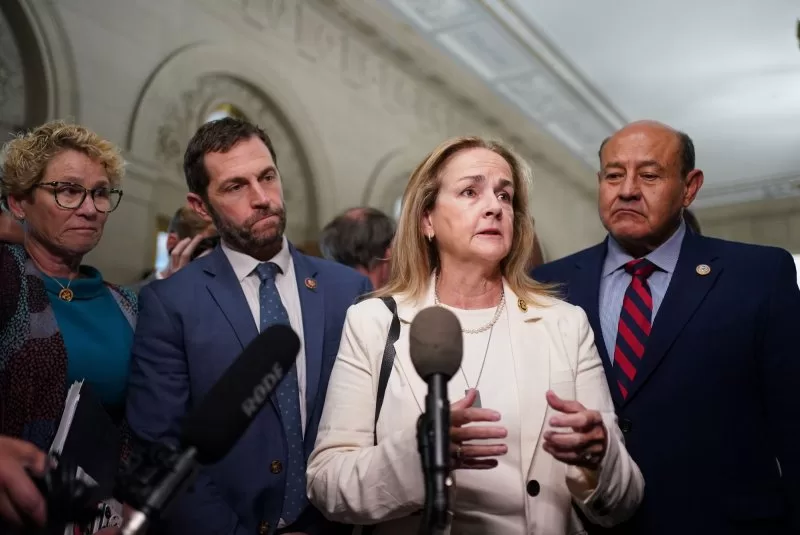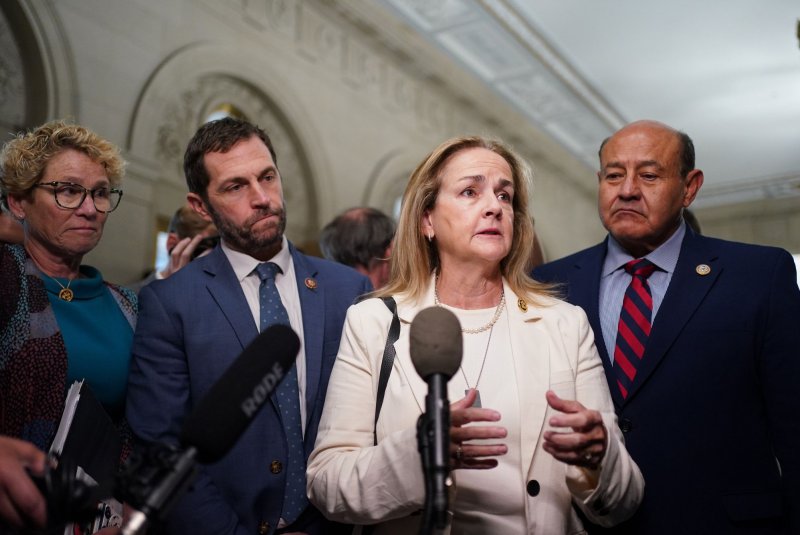1 of 2 | “Even as our economy recovers from the pandemic, people are still hurting from high prices at the grocery store,” said Rep. Madeleine Dean, D-Pa. (pictured this past month on Capitol Hill), on the topic of “shrinkflation.” Photo by Bonnie Cash/UPI |
License PhotoOct. 7 (UPI) — Two Democrat lawmakers have accused some of America’s biggest food and beverage corporations of profiting from “shrinkflation” and demanded they stop engaging in the practice.
Sen. Elizabeth Warren, D-Mass., and her House colleague Rep. Madeleine Dean, D-Pa., join a growing number of lawmakers and other officials calling for federal action to stop the practice of shrinkflation, which is when a corporation makes a product smaller but charges a higher or same price for it.
In letters obtained Sunday and addressed to General Mills, Coca-Cola and PepsiCo, Dean and Warren cite alleged tactics used over the years to pad company profits, and accused the companies of “dodging taxes” and taking part in a “pattern of profiteering” via shrinkflation.
Warren said “it’s just plain wrong” and characterized the corporate acts as “price gouging” and “tax dodging,” adding, “We can’t let them get away with this.”
“People have noticed that their box of Cheerios and bag of Doritos are smaller, but prices are higher,” Warren told NBC News. “And at the same time these giant corporations are paying lower tax rates than the average American.”
While overall inflation rose by 14% from July 2020 to July 2022, corporate profits, however, grew by 74% over that same period, according to a report on “greedflation” by Pennsylvania’s senior Sen. Bob Casey, a Democrat.
“Even as our economy recovers from the pandemic, people are still hurting from high prices at the grocery store,'” said Dean.
Warren and Dean’s letters request three specific points of information: the average price charged per ounce of soda or per ounce of cereal every year since 2018; how much more in federal taxes would have been paid had the 2017 Tax Cuts and Jobs Act not been in effect; and financial information relating to corporate executive bonuses or incentives during periods where American’s saw high inflation.
Charging more for products such as cereal while reducing size, said Dean, “means that Americans are paying more for less and big corporations are paying less than their fair share in taxes.”
Roughly 59% of the American population think corporate greed is a “major cause” of inflation while 25% say corporate greed is only a “minor” cause, according to data released in February from Navigator Research.
Casey’s report indicates that household products, such as toilet paper and paper towels, were nearly 35% more expensive per unit than in January 2019, with more than 10% of price increases allegedly due to shrinking the sizes of rolls and packages. It also points to a more than 26% price increase on Doritos and Oreos since January 2019, with nearly 10% of that “accomplished by giving families fewer chips and cookies for their dollar,” the report stated.
But an industry insider defended the practice by noting that price increase markups over the last three years “are not unusual” compared with other past economic recoveries.
“The industry remains focused on providing the best products at the most competitive price to consumers,” Sarah Gallo, senior vice president of federal affairs at Consumer Brands Association, a trade group of which Coca-Cola, PepsiCo and General Mills belong, told NBC.
Meanwhile, a marketing expert pointed out how reducing the size of products is looked at as an alternative to directly forcing higher pricers on U.S. consumers during periods of inflation.
“Final price increases draw much bigger backlash than volume decreases,” Nailya Ordabayeva, an associate professor of marketing at the Boston University’s Questrom School of Business. “So, between the two evils, the downsizing becomes a preferred option,” she added.
This is part of a broader legislative push by congressional Democrats to tackle the shrinkflation issue.
President Joe Biden, in his State of the Union speech earlier this year, had urged Congress to pass a “shrinkflation” bill, even going so far as to mention its sponsor — also a fellow native of Biden’s birthplace Scranton.
In February, Warren joined her Senate colleague from Dean’s Pennsylvania in introducing the Shrinkflation Prevention Act.
Casey’s bill would “crack down on corporations that deceive consumers by selling smaller sizes of their products without lowering prices.”
“Corporations are trying to pull the wool over our eyes by shrinking their products without reducing their prices,” Casey, a member of the Senate’s Finance Committee, said in February. “Anyone on a tight budget sees it every time they go to the grocery store.”
The “greedflation” issue, as Casey has characterized it, has even made its way in to Pennsylvania’s hotly contested Senate race with Casey’s re-election.
The SPA would direct the Federal Trade Commission to create new regulatory policies that establish “shrinkflation” as “an unfair or deceptive act or practice” and would prohibit manufacturers from engaging in the practice.
And it would empower the FTC and states to bring civil actions on corporations engaging in shrinkflation.
Similarly that same month Warren, Casey and others reintroduced the Price Gouging Prevention Ac, which would authorize the FTC and state attorneys general to enforce a federal ban against “grossly excessive price increases.”

